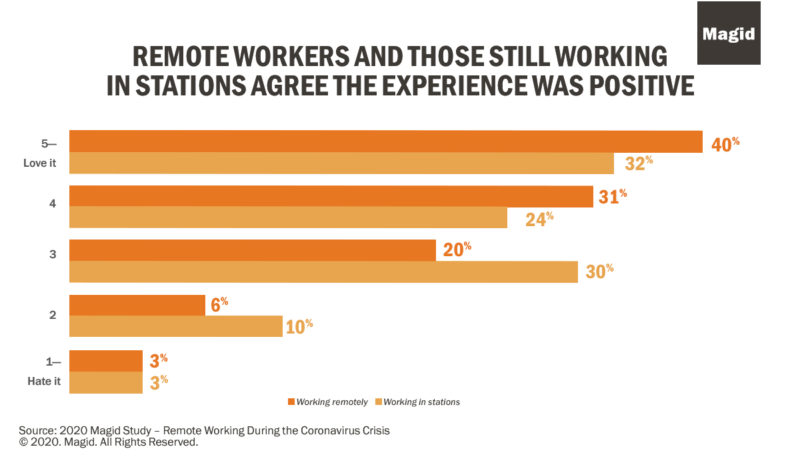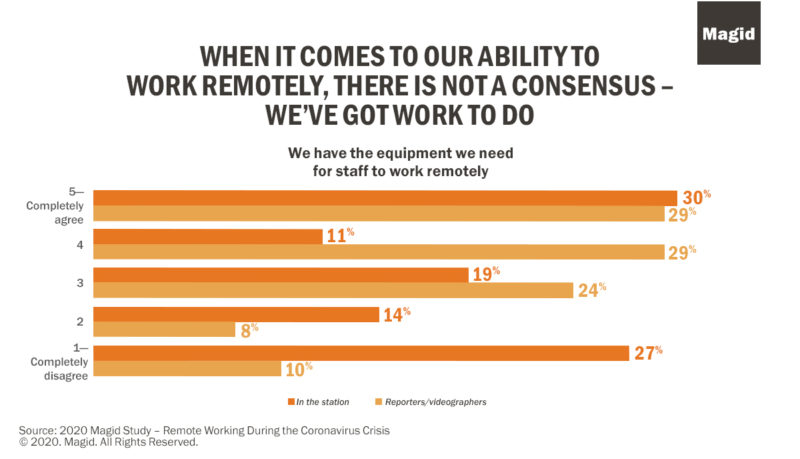Remote working » COVID-19 causes cultural shift in local media organizations
The COVID-19 outbreak forced broadcasters in every market to significantly change workflow, overnight. While some systems were already in place, no station was fully prepared to implement remote working across the organization.
To help assess the effectiveness of remote working during the crisis and inform what stations can do to improve overall workflow in the future, Magid conducted a detailed analysis of newsroom operations across the country during the first few months of working from home. This analysis included remote observation, in-depth interviews with station staff and leadership, and a nationwide study of more than 2,000 local station employees across all levels and departments including news, sales, engineering & IT, marketing, and more. What we found was an industry that figured out how to get it done and has a positive outlook on working remotely, but isn’t prepared structurally, technologically, or organizationally to do this on an ongoing basis. Our findings identify key considerations for every station in the industry on how to address challenges and keep the momentum going after the COVID-19 crisis and beyond.
Overwhelming acceptance
Despite the suddenness of the shift to remote work, most employees found the experience – whether they were working remotely or those still working in stations – positive, especially for those who noticed an impact on work-life balance.
Staff in all departments were also overwhelmingly positive about the desire to work remotely in the future, but it’s not seen as a permanent thing. 74% completely agreed after social distancing ends, they’d like the flexibility to be able to work remotely. But most don’t want to do so 100% of the time.
Staff don’t want to be forced to work remotely. Mandating 100% long-term or permanent work beyond the crisis has the potential to hurt morale and make employee retention challenging, depending on the department. It must be about workplace flexibility – allowing your teams to work from home some of the time. This can be a significant job benefit moving forward, for both retention and recruiting. But structure and clarity of communication will be critical in making any version of workplace flexibility successful.
Logistical challenges
Consumers and staff alike felt the challenges of the crisis made local news content more authentic and engaging. But stations are not built to sustain this type of workflow, and when it comes to the ability to work remotely, there is not a consensus across departments.
Our research found that those in news are far less likely to feel they have what they need to do this work remotely. Reporters and videographers in particular are feeling less confident in their skills and the tools they have to meet the increased demands of remote work. On the flip side, remote workers who are not in the field are confident they have the tools and skills needed.
To develop a sustainable long-term plan for workplace flexibility, stations need to assess and address equipment and technological training and limitations, by department and role. The technology and equipment will need to be improved across the board in order to permanently integrate workplace flexibility organization-wide. Ensure all departments are discussing the balancing of productivity and efficiency needs with engineering/IT requirements.
Looking ahead
In order to move forward with remote work and workplace flexibility options in the future, local media organizations need to emphasize and build upon the positive elements uncovered these past few critical months – while recognizing there are areas that need to improve to be viable options beyond times of crisis.
Interested in a deeper dive on these insights on remote work? Let’s talk.



